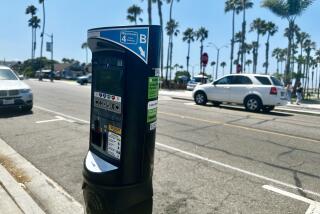CueCat Scanners Provoke Praise and Privacy Issues
- Share via
NEW YORK — Bar codes for Internet scanners called CueCats made their latest debut in print Sunday in the Dallas Morning News, even as the creators of this new technology grapple with concerns about privacy and ease of use.
The Dallas-based company that makes the scanners, Digital Convergence, says that it has given out nearly 2 million of the 10 million CueCats it hopes to distribute this year and that nearly half a million people have installed and used them.
The CueCats hook up to personal computers and, when swiped across bar codes, call the desired Web page up on a PC’s browser.
With the rollout just a few weeks old--Forbes, Wired and Parade magazines gave them to subscribers in early September and anyone can obtain one for free at a Radio Shack store--Digital Convergence is already making some adjustments.
First, the software was completely revamped after users found the original version, which contained lengthy videos and graphics, “clunky, cumbersome, and annoying,” said the company’s president, Michael Garin.
Digital Convergence is also making it clearer to users what kind of information is collected and what isn’t.
Some privacy groups have cautioned that the technology could be used to track individual online behavior because each CueCat has a unique digital identifier.
Digital Convergence is promising, however, to only collect aggregate data on age range, gender and ZIP code.
The company says the privacy issues are overblown because it doesn’t compile profiles on users. Users provide their name and e-mail address to register the software, but the company doesn’t divulge that information to others or use it when compiling the aggregate data.
“There’s a lot of smoke and no heat,” Garin said. “Even if we sold this company to Dr. Evil, you couldn’t reconstruct the information to tell what anyone is doing.”
The Dallas Morning News, whose parent company, Belo Corp., is an investor in Digital Convergence, is the first newspaper to start using the codes.
Others are set to follow later this year and early next year.
The idea behind the CueCat is that a bar code printed in a story, advertisement or catalog could direct a user to a page deep within a Web site, saving several clicks of the mouse to find specific information, such as a product description or movie listings in a certain neighborhood.
But some critics wonder whether the time saved is worth the hassle of installing another peripheral device to a PC and changing Web surfing habits.
The CueCats have already sparked debate online from columnists, users and computer experts over the technology’s ultimate usefulness.
Scott Rosenberg, managing editor of the online magazine Salon, called it a Rube Goldberg-type contraption, “an improbable creation that accomplishes nothing but that’s absurd in its complexity.”
Winner in This Game Will Be User-Friendly
“We’d have to become a nation of scanner-crazed checkout clerks to make it work,” Rosenberg wrote. “And if there’s anything the Web has taught those marketers smart enough to pay attention, it’s that you’ve got to adapt technology to people’s behavior.
“If you expect people to adapt to technology, your technology is likely to end up in the nearest landfill.”
Nonetheless, Digital Convergence’s publishing partners say they are sticking with the technology for now.
Wired, which prides itself in the technical sophistication of its readers, is trying out the CueCats but has also experimented with a competing technology from a company called Digimarc.
Forbes, which mailed out CueCat readers to all 830,000 of its subscribers last month, is getting a good response so far, but Forbes President Jim Berrien said the magazine could end up going a different way, based on the response from readers.
“If it’s not this technology, there’s some other version of it that will stick,” he said.
Like other publishers, Forbes says it’s satisfied with Digital Convergence’s approach to privacy.
But the company suffered a public relations blow last month when a security breach allowed a Web user to access the names and e-mail addresses of about 150,000 CueCat users.
The company said it has fixed the glitch and has offered $10 gift certificates and apologies to affected users.
On The Net: https://www.digitalconvergence.com.
More to Read
Inside the business of entertainment
The Wide Shot brings you news, analysis and insights on everything from streaming wars to production — and what it all means for the future.
You may occasionally receive promotional content from the Los Angeles Times.










